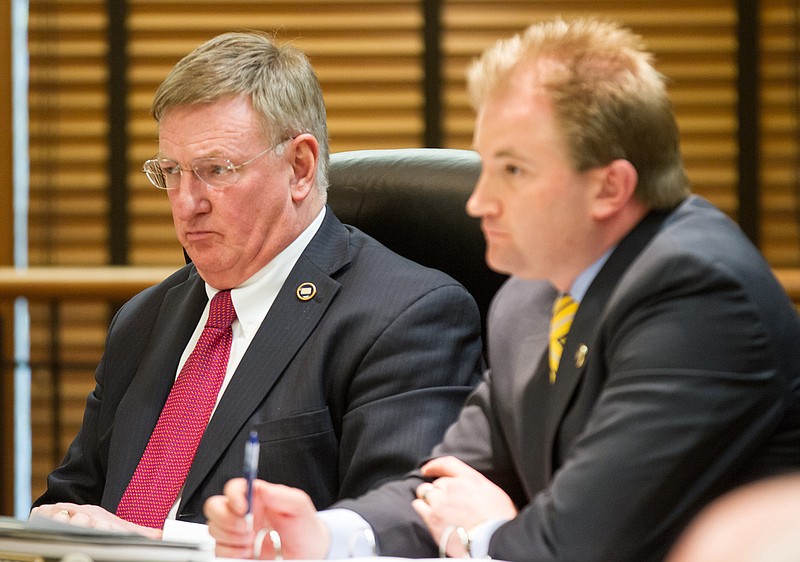Not having enough money is not a good enough excuse to not follow the law."
NASHVILLE - More than 663,000 Tennesseans will be prodded into buying auto insurance under a new law requiring annual insurance verification and raising penalties for drivers without coverage, state figures show.
The bill won final approval last week. A fiscal note by legislative staff cites a 2014 study by the Insurance Research Council study based on 2012 data indicating more than a fifth of Tennessee drivers don't have insurance - the sixth-highest uninsured motorist rate in the nation.
That means about 1.1 million of Tennessee's 5.5 million registered vehicles have no insurance, despite a state decades-old "fiscal responsibility law" generally requiring it, says the Fiscal Review Committee staff.
The fiscal note goes on to say that "various available studies" led to an estimate that 60 percent of uninsured motorists, or 663,300 of them, will be prompted to buy insurance - and be able to afford it - by the new and stricter enforcement system.
The new law calls for putting into place an "online verification system" that county court clerks must check when a vehicle's license plate comes up for renewal each year. If the vehicle is uninsured, it's tag cannot be renewed.
Read more
Insurance law finally may be enforced
The law takes effect July 1, assuming Gov. Bill Haslam gives his expected signature.
Penalties start with a $25 "coverage failure fee" if an uninsured vehicle is detected. Another $100 fine kicks in if proof of insurance is not provided within 30 days. The maximum general fine is $300, though the state Department of Commerce and Insurance may seek a special "civil penalty" of up to $250 per day of uninsured driving in some situations.
Now the maximum fine for not having insurance is $100, with law enforcement officers simply writing a ticket. The new law allows them to have uninsured vehicles towed.
The bill, sponsored by Rep. William Lamberth, R-Cottontown, inspired more than an hour of impassioned debate before House approval on a 63-25 vote. There was much less discussion in the Senate, where the bill was approved 25-2 under sponsorship of Senate Republican Caucus Chairman Bill Ketron of Murfreesboro.
Rep. Bill Dunn, R-Knoxville, said that as "a blue-collar kind of guy," his reading of the fiscal note "actually affected me emotionally" because of its commentary on those who will not be able to have a car under the new law. They will effectively be prodded to "sit at home and draw welfare 'cause they can't get to work," he said.
The fiscal note suggests that, while 60 percent of uninsured motorists will wind up getting insurance, half the rest - or about 221,000 - "will not be able to acquire or maintain adequate insurance and will not be able to renew." It estimates the cost of minimum liability insurance coverage at $300 per year.
Another 221,000 fall into an uncertain area, according to the fiscal note. For example, many may sign up for insurance to get their license plate, then let the policy lapse or cancel it. The bill lets counties impose an extra $25 fee when a motorist is caught doing that - in addition to triggering the other fines.
"It is true that we need to follow the law," Dunn said. "But it is our duty (as legislators) to make sure those laws are just," and the bill does not meet that test, he said.
"We are asking people to do something they cannot do and then we'll just keep fining them and fining them for not doing it," Dunn said. That doesn't account for costs for having a car towed and then "paying to have it sit on somebody's lot."
Rep. Joe Towns, D-Memphis, said he agreed with bill proponents that driving is a privilege and not a right. But he said the bill will effectively deprive thousands of people of the right to make a living, and he compared the legislative action to stealing a horse in pre-automobile days - a crime at the time often punished by hanging.
Lamberth and others countered that the bill will bring many who now simply ignore the state's poorly enforced law into compliance at a relatively modest cost, lowering insurance rates for law-abiding Tennesseans who pay higher rates because of uninsured motorists.
"Not having enough money is not a good enough excuse to not follow the law," said Lamberth.
"If you can't afford insurance, then you don't deserve to be on the road," said Rep. Rick Womick, R-Rockvale, recounting his daughter being "rear-ended by a single mom who was on a cellphone, late to work."
If that woman could afford "$600 a year for a cellphone," Womick said, she could afford $300 for insurance - and his daughter's own insurance "skyrocketed" because of a claim made under the uninsured motorist provision of her insurance policy.
Rep. Roger Kane, R-Knoxville, said 46 other states already have implemented "some sort of similar program." Kane, an insurance agent, said he would abstain from the vote, since the new law would prompt more people to buy insurance.
Two other legislators in the insurance business, Republican Reps. Charles Sargent of Franklin and Dennis Powers of Jacksboro, noted a potential conflict of interest while making speeches in support of the bill and voting for it.
The fiscal note includes a section assessing the "commercial impact" of the bill's passage. It says:
"Private sector jobs could increase for insurance companies and companies contracting with the state to develop and maintain the required program. However, private sector jobs could be negatively affected by people who will not be able to acquire or maintain adequate insurance and will not be able to renew or maintain motor vehicle registrations as a result of this bill. Any net impact on private sector jobs in Tennessee cannot be quantified with reasonable certainty."
